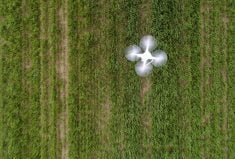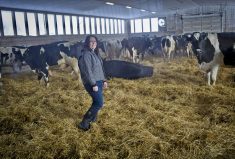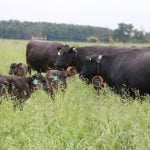Manitoba producers can ditch the paper when it comes to completing their environmental farm plan (EFP).
The online platform, which will exchange the old EFP workbooks for an online process, is now live, according to the Keystone Agricultural Producers (KAP).
Why it matters: While EFPs are a voluntary assessment of management practices, producers wanting to source cost-shared government funding will often find their participation contingent on a completed plan.
Read Also

Trade uncertainty, tariffs weigh on Canadian beef sector as market access shifts
Manitoba’s beef cattle producers heard more about the growing uncertainty they face as U.S. tariffs, and shifting trade opportunities, reshape their market.
KAP was tagged to help develop an online EFP platform back in 2020, with the federal and provincial governments pitching in $990,000 through the outgoing Canadian Agricultural Partnership framework to see the project come to fruition.
The hope was and is to streamline the system, as well as adding features that tailor the process to different farms and production systems rather than the one-size-fits-all approach of the old paper process. Completed applications then go through a third-party review, with reviewers sourced by KAP.
“KAP is pleased to have worked with government to deliver a tool that producers can confidently and easily use as they work to employ sustainable farming practices more easily in their operations,” KAP president Bill Campbell said.
“By shifting to an online platform, it will help producers address some of the challenges they faced in the past with accessing the program conveniently and provides a user-friendly and secure interface they can interact with online. This new platform will allow producers to have more convenient access, streamlined and customizable content, and a more simplified review process.”
At the same time, KAP said, the process through the new portal should make EFP renewal easier.
Agriculture Minister Derek Johnson also pointed to the system’s integration of national and international sustainability standards. The result, he said, will make it easier for producers to find the relevant requirements for specific markets.
“Our government is committed to supporting sustainable agriculture production practices such as sustainable water strategies and climate change mitigation activities,” he said. “The EFP is a valuable and proactive risk management tool. It includes a strong educational component that will continue to provide positive environmental outcomes while enabling the province to meet its goals for enhancing public trust in the agricultural sector.”
KAP has noted that producers will be able to generate multiple reports on sustainability standards through the platform.
The Manitoba Beef Producers also welcomed the new system.
“Many beef producers utilize the voluntary environmental farm plan and by taking it online it may become more readily accessible for some producers,” the group said.
Manitoba farms have completed 6,630 EFPs representing almost 10.8 million acres as of Oct. 20, according to information published on the newly launched platform.
Producers can access the platform at https://online.manitobaefp.ca/. The province has launched online video tutorials to familiarized interested farmers with the platform.
















